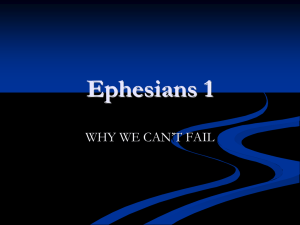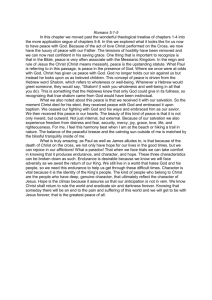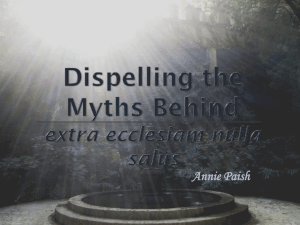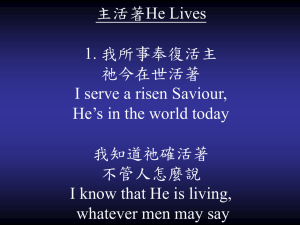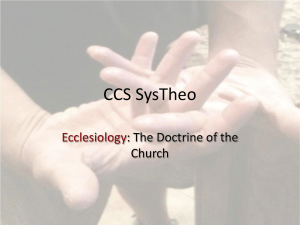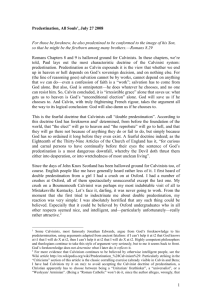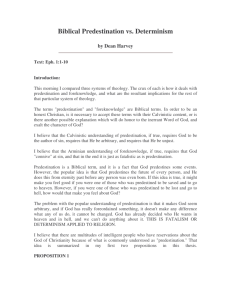What is the role of free will & predestination in our lives?
advertisement
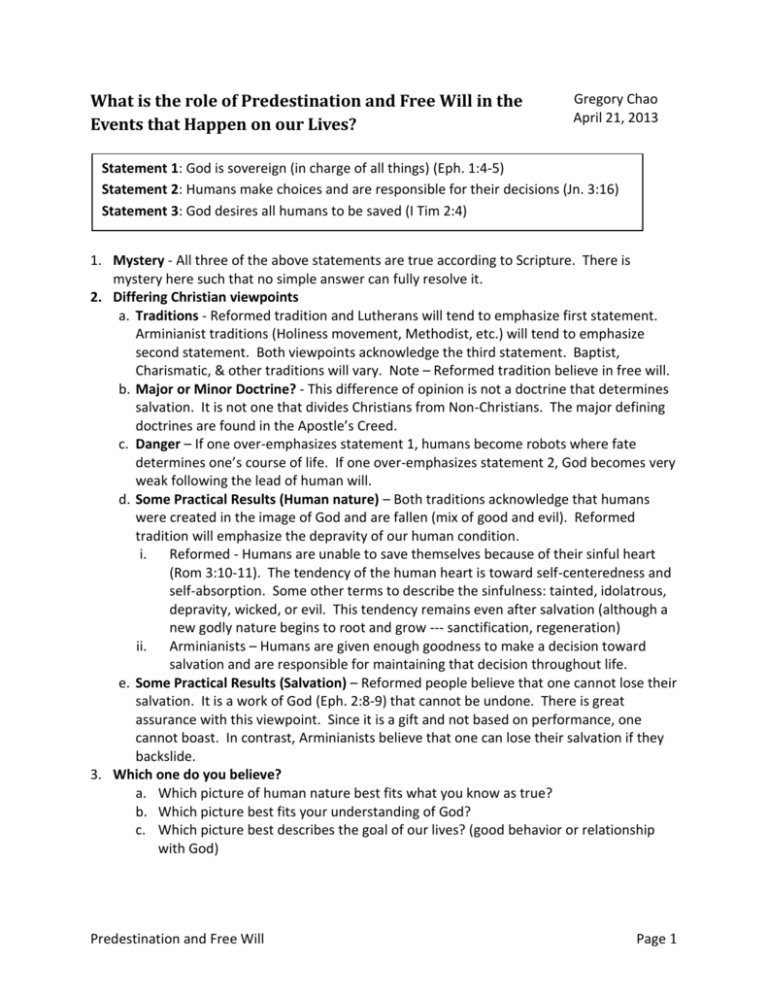
What is the role of Predestination and Free Will in the Events that Happen on our Lives? Gregory Chao April 21, 2013 Statement 1: God is sovereign (in charge of all things) (Eph. 1:4-5) Statement 2: Humans make choices and are responsible for their decisions (Jn. 3:16) Statement 3: God desires all humans to be saved (I Tim 2:4) 1. Mystery - All three of the above statements are true according to Scripture. There is mystery here such that no simple answer can fully resolve it. 2. Differing Christian viewpoints a. Traditions - Reformed tradition and Lutherans will tend to emphasize first statement. Arminianist traditions (Holiness movement, Methodist, etc.) will tend to emphasize second statement. Both viewpoints acknowledge the third statement. Baptist, Charismatic, & other traditions will vary. Note – Reformed tradition believe in free will. b. Major or Minor Doctrine? - This difference of opinion is not a doctrine that determines salvation. It is not one that divides Christians from Non-Christians. The major defining doctrines are found in the Apostle’s Creed. c. Danger – If one over-emphasizes statement 1, humans become robots where fate determines one’s course of life. If one over-emphasizes statement 2, God becomes very weak following the lead of human will. d. Some Practical Results (Human nature) – Both traditions acknowledge that humans were created in the image of God and are fallen (mix of good and evil). Reformed tradition will emphasize the depravity of our human condition. i. Reformed - Humans are unable to save themselves because of their sinful heart (Rom 3:10-11). The tendency of the human heart is toward self-centeredness and self-absorption. Some other terms to describe the sinfulness: tainted, idolatrous, depravity, wicked, or evil. This tendency remains even after salvation (although a new godly nature begins to root and grow --- sanctification, regeneration) ii. Arminianists – Humans are given enough goodness to make a decision toward salvation and are responsible for maintaining that decision throughout life. e. Some Practical Results (Salvation) – Reformed people believe that one cannot lose their salvation. It is a work of God (Eph. 2:8-9) that cannot be undone. There is great assurance with this viewpoint. Since it is a gift and not based on performance, one cannot boast. In contrast, Arminianists believe that one can lose their salvation if they backslide. 3. Which one do you believe? a. Which picture of human nature best fits what you know as true? b. Which picture best fits your understanding of God? c. Which picture best describes the goal of our lives? (good behavior or relationship with God) Predestination and Free Will Page 1 4. Some Biblical Examples a. Paul’s letters (you will see both predestination and free will in his letters) i. Ephesians 1:4,5 – “For he has chosen us in him before the creation of the world to be holy and blameless in his sight. In love he predestined us to be adopted as his sons/daughters through Jesus Christ, in accordance with his pleasure and will…” ii. Ephesians 5:1,2 – “Be imitators of God, therefore, as dearly loved children and live a life of love, just as Christ loved us and gave himself up for us…” b. Jesus’ words (you will see both predestination and free will) i. John 15:14-17 – “You are my friends if you do what I command. I no longer call you servants, because a servant does not know his master’s business. Instead, I have called you friends, for everything that I learned from my Father I have made know to you. You did not choose me, but I chose you and appointed you to go and bear fruit---fruit that will last. Then the Father will give you whatever you ask in my name. This is my command: love each other.” 5. Second Helvetic Confession, section 5.052-5.057 (Book of Confessions) GOD HAS ELECTED US OUT OF GRACE. From eternity God has freely, and of his mere grace, without any respect to men, predestinated or elected the saints whom he wills to save in Christ, according to the saying of the apostle, “God chose us in him before the foundation of the world” (Eph. 1:4). And again: “Who saved us and called us with a holy calling, not in virtue of our works but in virtue of his own purpose and the grace which he gave us in Christ Jesus ages ago, and now has manifested through the appearing of our Savior Christ Jesus” (II Tim. 1:9 f.). WE ARE ELECTED OR PREDESTINATED IN CHRIST. Therefore, although not on account of any merit of ours, God has elected us, not directly, but in Christ, and on account of Christ, in order that those who are now ingrafted into Christ by faith might also be elected. But those who were outside Christ were rejected, according to the word of the apostle, “Examine yourselves, to see whether you are holding to your faith. Test yourselves. Do you not realize that Jesus Christ is in you?—unless indeed you fail to meet the test!” (II Cor. 13:5). WE ARE ELECTED FOR A DEFINITE PURPOSE. Finally, the saints are chosen in Christ by God for a definite purpose, which the apostle himself explains when he says, “He chose us in him for adoption that we should be holy and blameless before him in love. He destined us for adoption to be his sons through Jesus Christ that they should be to the praise of the glory of his grace” (Eph. 1:4 ff.). WE ARE TO HAVE A GOOD HOPE FOR ALL. And although God knows who are his, and here and there mention is made of the small number of elect, yet we must hope well of all, and not rashly judge any man to be a reprobate. For Paul says to the Philippians, “I thank my God for you all” (now he speaks of the whole Church in Philippi), “because of your fellowship in the Gospel, being persuaded that he who began a good work in you will bring it to completion at the day of Jesus Christ. It is also right that I have this opinion of you all” (Phil. 1:3 ff.). Predestination and Free Will Page 2 WHETHER FEW ARE ELECT. And when the Lord was asked whether there were few that should be saved, he does not answer and tell them that few or many should be saved or damned, but rather he exhorts every man to “strive to enter by the narrow door” (Luke 13:24): as if he should say, It is not for you curiously to inquire about these matters, but rather to endeavor that you may enter into heaven by the straightway. WHAT IN THIS MATTER IS TO BE CONDEMNED. Therefore we do not approve of the impious speeches of some who say, “Few are chosen, and since I do not know whether I am among the number of the few, I will enjoy myself.” Others say, “If I am predestinated and elected by God, nothing can hinder me from salvation, which is already certainly appointed for me, no matter what I do. But if I am in the number of the reprobate, no faith or repentance will help me, since the decree of God cannot be changed. Therefore all doctrines and admonitions are useless.” Now the saying of the apostle contradicts these men: “The Lord’s servant must be ready to teach, instructing those who oppose him, so that if God should grant that they repent to know the truth, they may recover from the snare of the devil, after being held captive by him to do his will” (II Tim. 2:23 ff.). 6. Some Miscellaneous Technical Points (for the hardcore aficionado) a. Foreknowledge – In Reformed thinking, God goes beyond foreknowledge. Foreknowledge says that God knows beforehand the choices humans make and then set history in motion based on it. In Predestination, God sets history in motion not based on human decisions but only based on his own good will. God is in charge and in control of all things. b. TULIP (Five Point Calvinism) – Many have used the acronym to explain predestination (Total depravity, Unconditional election, Limited atonement, Irresistible grace, Highly Recommended Book on TULIP: Perseverance of the Saints). I personally Calvinism in the Las Vegas Airport: have not had good success explaining it Making Connections in Today’s World using this method. It is too simplistic and by Richard Mouw easy to be misunderstood. God can be seen as an arbitrary and cruel judge. Richard Mouw, in his excellent book, good explains the acronym in a nuance manner. c. Double Predestination – It is the belief that God not only predestined those who go to heaven (elect) but those who go to hell (reprobate). It is not generally held by most in the PCUSA. In PCUSA’s Book of Confessions, it is only found in one confession, the Westminster Confession. However, at the end of the confession, there is a declaratory statement (6.192) clarifying the doctrine, “With reference to Chapter III of the Confession of Faith, that concerning those who are saved in Christ, the doctrine of God's eternal decree is held in harmony with the doctrine of his love to all mankind, his gift of his Son to be the propitiation for the sins of the whole world, and his readiness to bestow his saving grace on all who seek it; that concerning those who perish, the doctrine of God's eternal decree is held in harmony with the doctrine that God desires not the death of any sinner, but has provided in Christ a salvation sufficient for all, adapted to all, and freely offered in the gospel to all, that men are fully responsible for Predestination and Free Will Page 3 their treatment of God's gracious offer; that his decree hinders no man from accepting that offer; and that no man is condemned except on the grounds of his sin.” d. John Calvin – It is difficult to exactly pinpoint whether John Calvin believed in double predestination or not. Certainly, TULIP did not come from him. He was very willing to live with the creative tension and leave it a mystery. Calvin did not make the doctrine of predestination the centerpiece of his teaching by any means. He made only a few passing references to it in his 1536 Institutes. No single question in his 1545 Catechism is devoted to the subject. He believed it was important because it underscored that salvation is entirely the work and gift of God and that man contributes nothing at all to it. (John Calvin, Pilgrim and Pastor, W. Robert Godfrey, 2009). Predestination and Free Will Page 4

